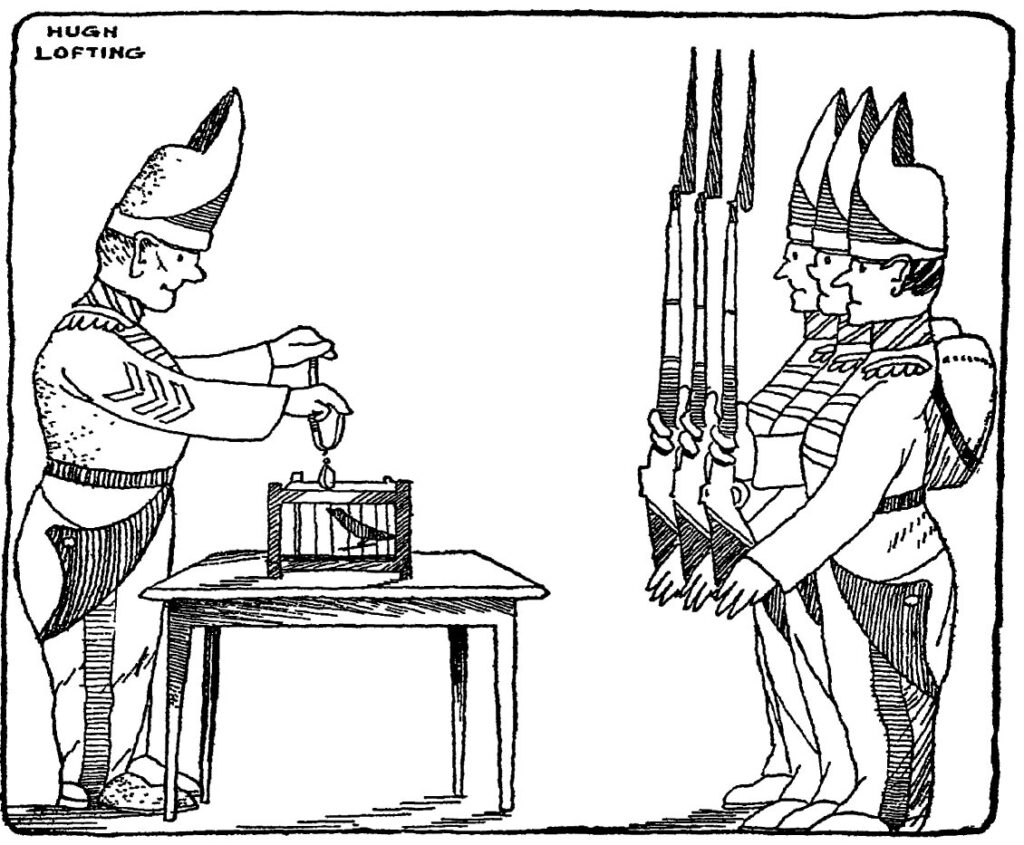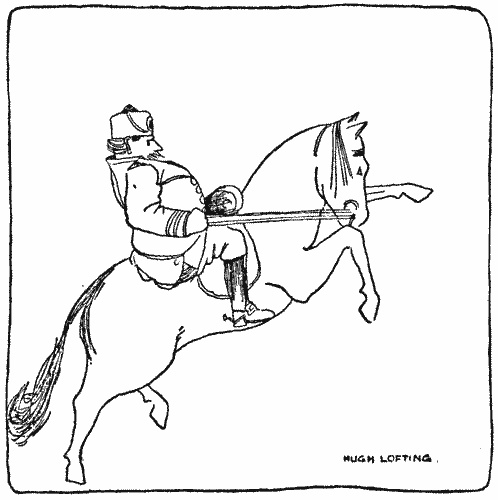The army and orders – should every order be obeyed mindlessly?
In parts: Doctor Dolittle’s Caravan (1926) and Doctor Dolittle and the Green Canary (1950), the green canary Pipinella tells a turbulent episode in her life when she was a canary-mascot of an army regiment at the begining of the 20th century.

These were times of rapid industrial development, when people moved en masse to cities to work in newly established mines and factories, because this work allowed them to have a better life than in the countryside, to feed their families and maintain their homes. However, after the establishment of these industrial plants, there was the development of mechanization, steam engines, and various ways of replacing the work of human hands more efficiently.
This resulted in mass layoffs of employees who, due to the lack of any labor law, lost their source of income day by day and sooner or later, along with their entire families, began to starve. The phenomenon was so massive that it resulted in mass protests threatening the owners of property and authority.
The reaction of the authorities is easy to guess. They sent an armed army – infantry with muskets (and Pipinella in a cage) – directly against unarmed workers. The army had orders to march and shoot into the crowd.
However, the soldiers were normal people and on the one hand they did not want to harm the workers, on the other hand they could not directly disobey the orders.
The solution was both simple, brilliant and surprising to readers. The marching army fired muskets over the heads of protesting workers. No one was hit. However, they marched on. They marched until they clashed with the crowd. However, during the clash, the soldiers fought so weakly that they allowed themselves to be defeated and disarmed. In this way, the workers did not suffer, they obtained weapons and… a cage with Pipinella.
The regiment commander was punished by being sent to fight in colonies, but it was not burdensome for him.
What does this story teach? Is following orders always good? Are there other alternative ways to solve the problems?
A wasp’s story about the sense and senselessness of war
In the part of Doctor Dolittle’s Garden (1927), Doctor Dolittle learns insect speech. This type of animal language is difficult to master.
During his research, the doctor talks to a wasp named Tangerina. She told a story about the war titled “How I won the Battle of Bunkerloo.”
She lived in a nest in one of the trees in a beautiful valley around the hills. The military must have liked this valley because battles of beautifully uniformed troops equipped with cannons, wagons and horses were regularly fought here. This is probably a reference to what the author, Hugh Lofting, saw during The Great War (World War I).
“For hours they would shoot off evil-smelling gunpowder, blowing some of the trees right out of the ground by the roots and destroying simply no end of wasps’ nests—some of them quite new ones which we had spent days and weeks in building . Then, after they had fought for hours, they would go away again, leaving hundreds of dead men and horses on the ground which smelt terribly after a few days—even worse than the gunpowder.”
“And it never seemed to settle anything. Because in a year or two they’d be back again for another battle and ruin the landscape some more.
[…]
“It was clear that the general had come up to this high point so he could get a good view of the fight—also no doubt because he wanted to stay in a safe place himself. Evidently, from the way in which he kept blowing out his mustaches, he expected a very fine battle—one of his messiest. Before he would be done with our beautiful valley it would be just a howling wilderness full of broken trees, dead and wounded men and maimed horses.
Then Tangierina stung the general’s horse on which he was sitting, and he fled from the battlefield. His army, thinking that their general was fleeing, fled with him. This is how the battle didn’t happen.

What does this story teach? What is author’s Hugh Lofting’s attitude towards war?
How did the cruel King Mashtu become the ruler of the entire World?
In the antediluvian times, the cruel King Mashtu took power over the world. We know this from Doctor Dolittle’s Post Office (1923) and Doctor Dolittle and the Secret Lake (1948).
‘Tell me, Mudface,’ said the Doctor after we had gone about a mile, ‘how did King Mashtu come to get all this – power you spoke of?’
‘Through the children – mostly,’ said the turtle quietly.
‘The children?’ cried the Doctor in surprise. ‘I don’t understand.’
‘Well,’ Mudface answered, ‘King Mashtu was all in favour of education. But instead of educating the children in the right way, in honesty and fairness, this king saw that an easier way to power for himself was to educate them the wrong way.
‘Oh, Mashtu was clever. He taught those youngsters – never to doubt his word. Then, when they were old enough to vote for him, he slyly put over his scheme for a one-man government for Shalba. – That is, a government run really by a single person. He knew that even though many were allowed to take part in running the country, one and one only should be the head, His word must be the law. And he lived and dreamed of one plan alone: that he, Mashtu, should be that head. He counted the days till he should be elected not only the head of the government, but King of Shalba.’
Does this remind you of anything? Can the education system be used to direct the thinking of children who later become adults?
